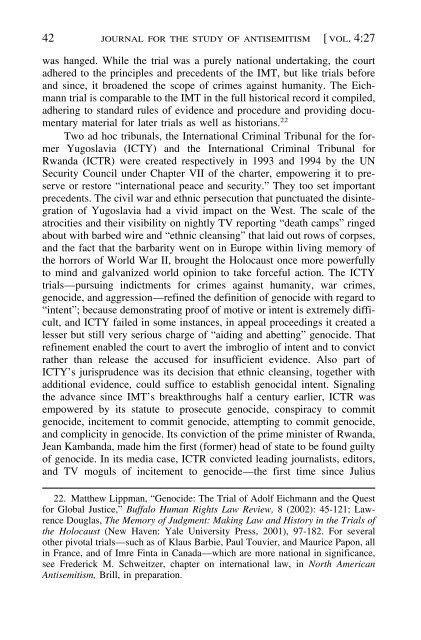Volume 4 No 1 - Journal for the Study of Antisemitism
Volume 4 No 1 - Journal for the Study of Antisemitism
Volume 4 No 1 - Journal for the Study of Antisemitism
Create successful ePaper yourself
Turn your PDF publications into a flip-book with our unique Google optimized e-Paper software.
42 JOURNAL FOR THE STUDY OF ANTISEMITISM [ VOL. 4:27<br />
was hanged. While <strong>the</strong> trial was a purely national undertaking, <strong>the</strong> court<br />
adhered to <strong>the</strong> principles and precedents <strong>of</strong> <strong>the</strong> IMT, but like trials be<strong>for</strong>e<br />
and since, it broadened <strong>the</strong> scope <strong>of</strong> crimes against humanity. The Eichmann<br />
trial is comparable to <strong>the</strong> IMT in <strong>the</strong> full historical record it compiled,<br />
adhering to standard rules <strong>of</strong> evidence and procedure and providing documentary<br />
material <strong>for</strong> later trials as well as historians. 22<br />
Two ad hoc tribunals, <strong>the</strong> International Criminal Tribunal <strong>for</strong> <strong>the</strong> <strong>for</strong>mer<br />
Yugoslavia (ICTY) and <strong>the</strong> International Criminal Tribunal <strong>for</strong><br />
Rwanda (ICTR) were created respectively in 1993 and 1994 by <strong>the</strong> UN<br />
Security Council under Chapter VII <strong>of</strong> <strong>the</strong> charter, empowering it to preserve<br />
or restore “international peace and security.” They too set important<br />
precedents. The civil war and ethnic persecution that punctuated <strong>the</strong> disintegration<br />
<strong>of</strong> Yugoslavia had a vivid impact on <strong>the</strong> West. The scale <strong>of</strong> <strong>the</strong><br />
atrocities and <strong>the</strong>ir visibility on nightly TV reporting “death camps” ringed<br />
about with barbed wire and “ethnic cleansing” that laid out rows <strong>of</strong> corpses,<br />
and <strong>the</strong> fact that <strong>the</strong> barbarity went on in Europe within living memory <strong>of</strong><br />
<strong>the</strong> horrors <strong>of</strong> World War II, brought <strong>the</strong> Holocaust once more powerfully<br />
to mind and galvanized world opinion to take <strong>for</strong>ceful action. The ICTY<br />
trials—pursuing indictments <strong>for</strong> crimes against humanity, war crimes,<br />
genocide, and aggression—refined <strong>the</strong> definition <strong>of</strong> genocide with regard to<br />
“intent”; because demonstrating pro<strong>of</strong> <strong>of</strong> motive or intent is extremely difficult,<br />
and ICTY failed in some instances, in appeal proceedings it created a<br />
lesser but still very serious charge <strong>of</strong> “aiding and abetting” genocide. That<br />
refinement enabled <strong>the</strong> court to avert <strong>the</strong> imbroglio <strong>of</strong> intent and to convict<br />
ra<strong>the</strong>r than release <strong>the</strong> accused <strong>for</strong> insufficient evidence. Also part <strong>of</strong><br />
ICTY’s jurisprudence was its decision that ethnic cleansing, toge<strong>the</strong>r with<br />
additional evidence, could suffice to establish genocidal intent. Signaling<br />
<strong>the</strong> advance since IMT’s breakthroughs half a century earlier, ICTR was<br />
empowered by its statute to prosecute genocide, conspiracy to commit<br />
genocide, incitement to commit genocide, attempting to commit genocide,<br />
and complicity in genocide. Its conviction <strong>of</strong> <strong>the</strong> prime minister <strong>of</strong> Rwanda,<br />
Jean Kambanda, made him <strong>the</strong> first (<strong>for</strong>mer) head <strong>of</strong> state to be found guilty<br />
<strong>of</strong> genocide. In its media case, ICTR convicted leading journalists, editors,<br />
and TV moguls <strong>of</strong> incitement to genocide—<strong>the</strong> first time since Julius<br />
22. Mat<strong>the</strong>w Lippman, “Genocide: The Trial <strong>of</strong> Adolf Eichmann and <strong>the</strong> Quest<br />
<strong>for</strong> Global Justice,” Buffalo Human Rights Law Review, 8 (2002): 45-121; Lawrence<br />
Douglas, The Memory <strong>of</strong> Judgment: Making Law and History in <strong>the</strong> Trials <strong>of</strong><br />
<strong>the</strong> Holocaust (New Haven: Yale University Press, 2001), 97-182. For several<br />
o<strong>the</strong>r pivotal trials—such as <strong>of</strong> Klaus Barbie, Paul Touvier, and Maurice Papon, all<br />
in France, and <strong>of</strong> Imre Finta in Canada—which are more national in significance,<br />
see Frederick M. Schweitzer, chapter on international law, in <strong>No</strong>rth American<br />
<strong>Antisemitism</strong>, Brill, in preparation.














